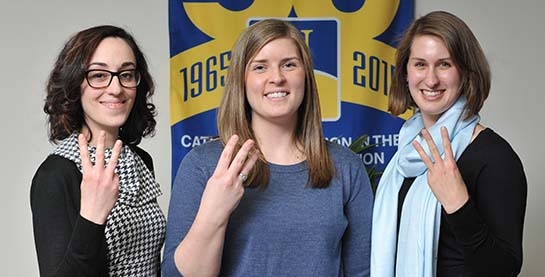
A team of Neumann graduate students has won third place in a national ethics competition, sponsored by the American Counseling Association (ACA). Elizabeth Barr, Stephanie Fortunato and Laura Strubeck brought home the honor for their entry in the ACA Graduate Student Ethics Case Study Competition. All three are students in the master’s degree program in Pastoral Clinical Mental Health Counseling.
The competition involved submitting an essay in response to a mock ethical scenario presented by the ACA Ethics Committee. Submissions were judged by several criteria, including clearly identifying the ethical dilemma, proposing and justifying action, writing clearly and concisely, and citing appropriate scholarly literature.
The ACA presented this situation for ethical analysis:
A counselor has just moved her private practice into a new office building, and there have been robberies in the neighborhood. The rental company has agreed to install cameras in the lobby and will also reimburse the counselor for the expense of a part-time security guard. The counselor knows that one of her clients is doing part-time security work while on administrative leave, and she is considering hiring him in the evenings. He is seeing her because of his stress stemming from the death of his partner in a work-related shooting incident and depression due to his wife’s recent, serious illness. Additionally, he knows the counselor is an expert in chronic illness and stress, and is thinking of asking her to see his wife, who is having a great deal of trouble dealing with her recent diagnosis.
The teams that finished first and second are from Northeastern Illinois University and the College of William and Mary. There were 76 submissions in the master’s level competition.
"It's nice to know that Neumann can compete with better known schools," Strubeck said. "I loved the ethics class."
"We broke the paper up based on our strengths and interests," explained Fortunato. After collaborating for two months, the trio produced a 15-page paper that addressed managing multiple relationships, maintaining appropriate boundaries, addressing privacy concerns, and recognizing power differentials. To collaborate in the most efficient way, the group used Google Docs to work on the same draft in real time.
According to Sr. Suzanne Mayer, Ph.D., coordinator of the Pastoral Counseling program, "The area of ethics is, naturally, of great consequence to those in counselor education programs. The ACA promotes not only standards of best practice but the critical thinking necessary to apply them. I am so proud of these three excellent students."
Winners will be recognized in the ACA journal, Counseling Today, and the papers will be submitted for consideration of publication to the online journal, VISTAS. Winning teams will also be invited to attend the ACA Annual Conference & Expo, scheduled this year for March 31 through April 3 in Montreal.
According to the ACA website, “The purpose of the competition is to educate members of the association regarding ethical issues and to engage graduate students (masters and doctoral level) in critically analyzing a potential ethical case and creating an appropriate ethical decision making plan to respond to the ethical situation.”
 CHALLENGE
CHALLENGE





